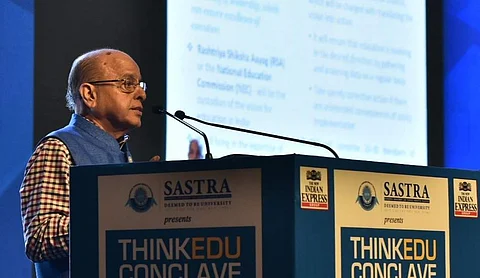

The National Education Policy (NEP), which is likely to be released soon, will be responsive to feedback from the implementation, stated Dr K Kasturirangan, NEP Drafting Committee Chairperson, speaking at TNIE's ThinkEdu Conclave 2020, organised in Chennai on Wednesday. The new draft of the policy, which the Government of India would like to bring out to meet the changing dynamics of the population's requirement with regards to quality education, innovation and research, was at the centre of contention when it was released in 2019.
The session was chaired by S Vaidhyasubramaniam, Vice-Chancellor of SASTRA Deemed-to-be University. Speaking at the event, Dr Kasturirangan, while clarifying the purpose of various key recommendations, said that the committee will have to, "ensure that the policy is responsive to feedback from the implementation which would extend to the next 10-20 years."
He said that when the Central Government approached him to help develop a new policy which would stand the test of time and stay relevant for the next two or three decades, he realised that every aspect of the policy had to be open-minded.
The proposed School Complex System, setting up of a central National Education Commission (NEC), the three-language formula and integrating vocational education into the mainstream education were the topics discussed most in the country.
The draft policy recommends that multiple public schools be brought together to form a school complex that would consolidate sub-optimal schools with low enrollment. While many educationalists and activists fear that merging schools into a complex would lead to the closure of valuable schools in remote areas from where children cannot travel far, Kasturirangan said that "the small size of schools makes it operationally complex to deploy teachers and critical physical resources and the school complexes will make it easier to pool resources."
The National Education Commission or the Rashtriya Shiksha Ayog (RSA), an apex body for education to be headed by the Prime Minister, was once again at the heart of criticism for two reasons: one, many said that having political leaders call the shots on the apex educational body would hinder the objectivity of the education system and two, it would prevent decentralisation of strategies that will cater to the diverse problems of the country.
Dr Kasturirangan, however, argued that the purpose of setting up an apex body is to lead to the creation of "institutional memory" that will help educationalists in the country learn from past solutions and prevent recurrence of the same set of problems. "At least half of the commission will be the most eminent educationalists of the country and the other half will be top politicians. This is to ensure that the highest authority directly watches over the education system," he said.
Addressing the concept of the three-language formula, he said that children have the highest learning capacity for languages when they are at elementary school.
He added that the focus of the policy will continue to remain on liberal and flexible education at the high school and undergraduate level. He further added that the policy has given utmost importance to research and innovation. "The United States generates $1.3 trillion through research and innovation and that's about a third of their economy. Given that India aspires for a $5 trillion economy, this will be apt," he said.
